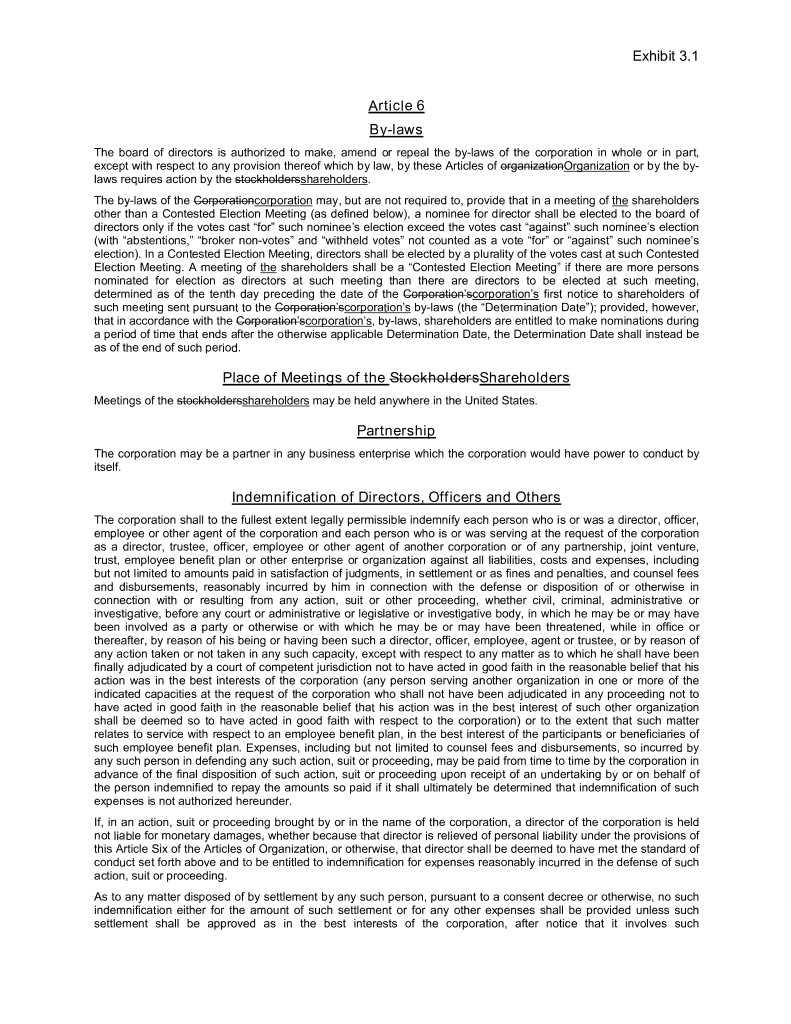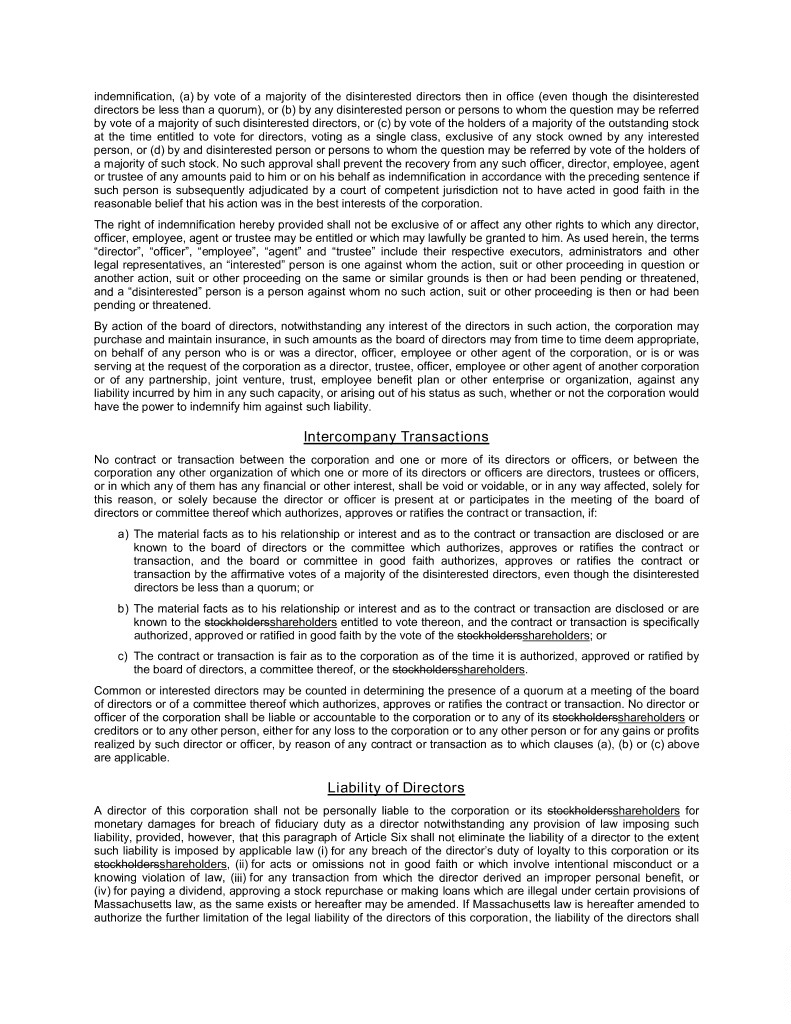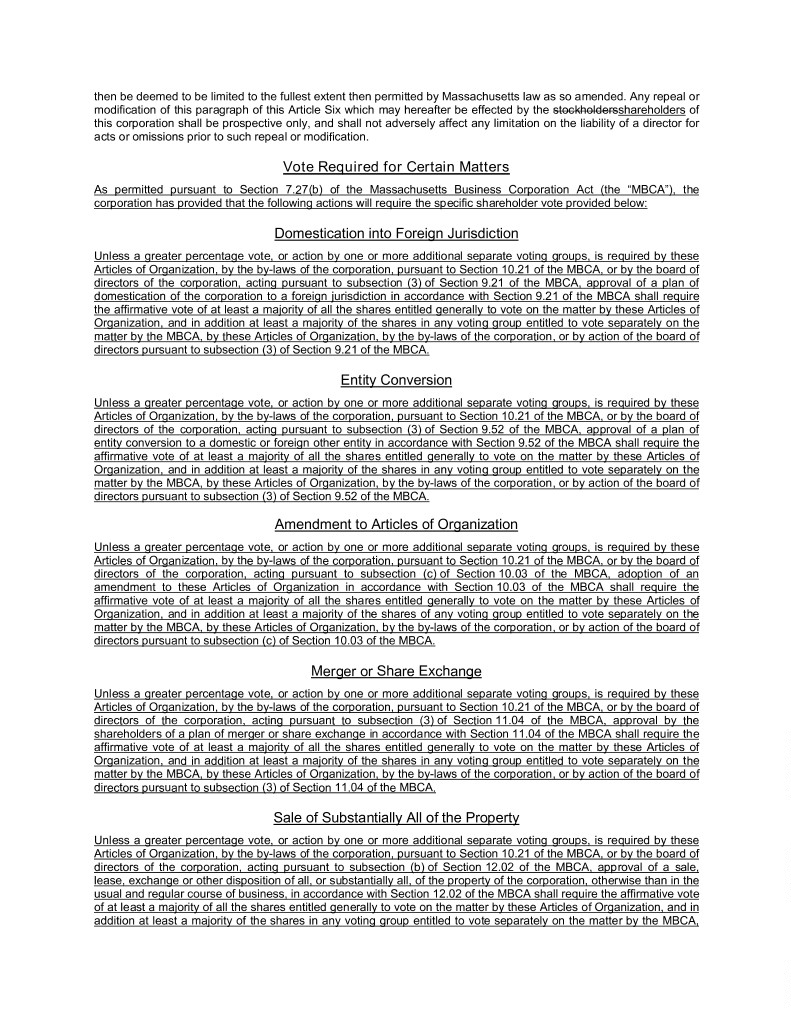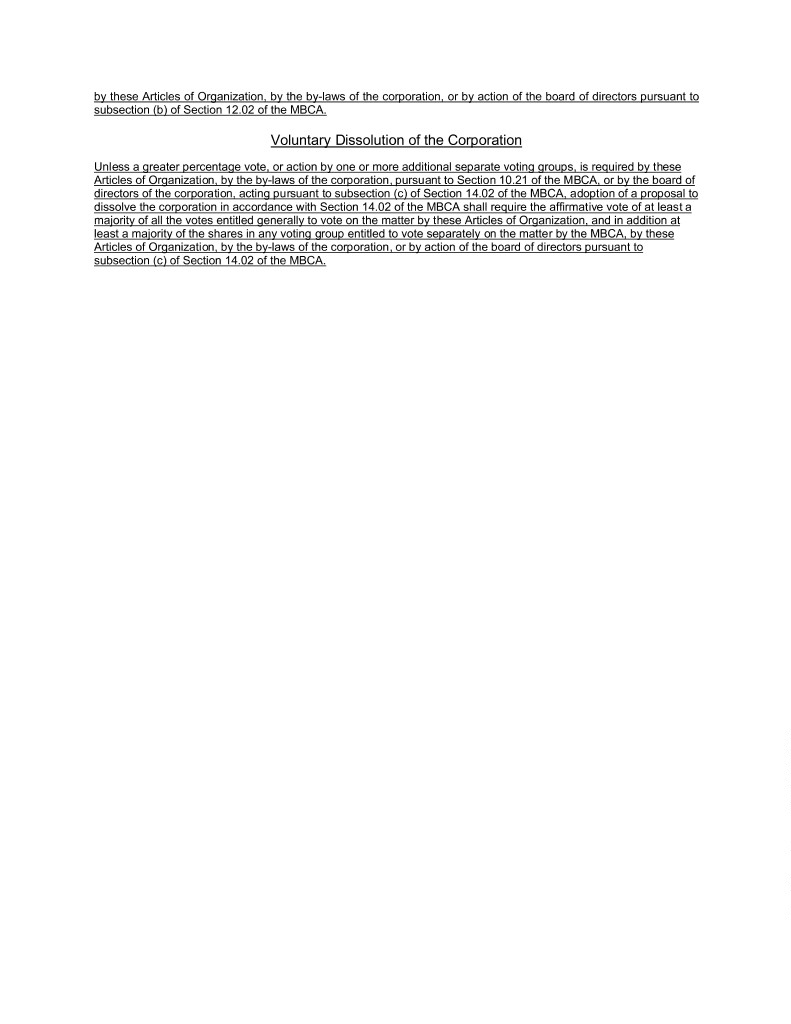Attached files
| file | filename |
|---|---|
| 8-K - 8-K - STATE STREET CORP | form8-k2018annualsharehold.htm |

Exhibit 3.1 Article 6 By-laws The board of directors is authorized to make, amend or repeal the by-laws of the corporation in whole or in part, except with respect to any provision thereof which by law, by these Articles of organizationOrganization or by the by- laws requires action by the stockholdersshareholders. The by-laws of the Corporationcorporation may, but are not required to, provide that in a meeting of the shareholders other than a Contested Election Meeting (as defined below), a nominee for director shall be elected to the board of directors only if the votes cast “for” such nominee’s election exceed the votes cast “against” such nominee’s election (with “abstentions,” “broker non-votes” and “withheld votes” not counted as a vote “for” or “against” such nominee’s election). In a Contested Election Meeting, directors shall be elected by a plurality of the votes cast at such Contested Election Meeting. A meeting of the shareholders shall be a “Contested Election Meeting” if there are more persons nominated for election as directors at such meeting than there are directors to be elected at such meeting, determined as of the tenth day preceding the date of the Corporation’scorporation’s first notice to shareholders of such meeting sent pursuant to the Corporation’scorporation’s by-laws (the “Determination Date”); provided, however, that in accordance with the Corporation’scorporation’s, by-laws, shareholders are entitled to make nominations during a period of time that ends after the otherwise applicable Determination Date, the Determination Date shall instead be as of the end of such period. Place of Meetings of the StockholdersShareholders Meetings of the stockholdersshareholders may be held anywhere in the United States. Partnership The corporation may be a partner in any business enterprise which the corporation would have power to conduct by itself. Indemnification of Directors, Officers and Others The corporation shall to the fullest extent legally permissible indemnify each person who is or was a director, officer, employee or other agent of the corporation and each person who is or was serving at the request of the corporation as a director, trustee, officer, employee or other agent of another corporation or of any partnership, joint venture, trust, employee benefit plan or other enterprise or organization against all liabilities, costs and expenses, including but not limited to amounts paid in satisfaction of judgments, in settlement or as fines and penalties, and counsel fees and disbursements, reasonably incurred by him in connection with the defense or disposition of or otherwise in connection with or resulting from any action, suit or other proceeding, whether civil, criminal, administrative or investigative, before any court or administrative or legislative or investigative body, in which he may be or may have been involved as a party or otherwise or with which he may be or may have been threatened, while in office or thereafter, by reason of his being or having been such a director, officer, employee, agent or trustee, or by reason of any action taken or not taken in any such capacity, except with respect to any matter as to which he shall have been finally adjudicated by a court of competent jurisdiction not to have acted in good faith in the reasonable belief that his action was in the best interests of the corporation (any person serving another organization in one or more of the indicated capacities at the request of the corporation who shall not have been adjudicated in any proceeding not to have acted in good faith in the reasonable belief that his action was in the best interest of such other organization shall be deemed so to have acted in good faith with respect to the corporation) or to the extent that such matter relates to service with respect to an employee benefit plan, in the best interest of the participants or beneficiaries of such employee benefit plan. Expenses, including but not limited to counsel fees and disbursements, so incurred by any such person in defending any such action, suit or proceeding, may be paid from time to time by the corporation in advance of the final disposition of such action, suit or proceeding upon receipt of an undertaking by or on behalf of the person indemnified to repay the amounts so paid if it shall ultimately be determined that indemnification of such expenses is not authorized hereunder. If, in an action, suit or proceeding brought by or in the name of the corporation, a director of the corporation is held not liable for monetary damages, whether because that director is relieved of personal liability under the provisions of this Article Six of the Articles of Organization, or otherwise, that director shall be deemed to have met the standard of conduct set forth above and to be entitled to indemnification for expenses reasonably incurred in the defense of such action, suit or proceeding. As to any matter disposed of by settlement by any such person, pursuant to a consent decree or otherwise, no such indemnification either for the amount of such settlement or for any other expenses shall be provided unless such settlement shall be approved as in the best interests of the corporation, after notice that it involves such

indemnification, (a) by vote of a majority of the disinterested directors then in office (even though the disinterested directors be less than a quorum), or (b) by any disinterested person or persons to whom the question may be referred by vote of a majority of such disinterested directors, or (c) by vote of the holders of a majority of the outstanding stock at the time entitled to vote for directors, voting as a single class, exclusive of any stock owned by any interested person, or (d) by and disinterested person or persons to whom the question may be referred by vote of the holders of a majority of such stock. No such approval shall prevent the recovery from any such officer, director, employee, agent or trustee of any amounts paid to him or on his behalf as indemnification in accordance with the preceding sentence if such person is subsequently adjudicated by a court of competent jurisdiction not to have acted in good faith in the reasonable belief that his action was in the best interests of the corporation. The right of indemnification hereby provided shall not be exclusive of or affect any other rights to which any director, officer, employee, agent or trustee may be entitled or which may lawfully be granted to him. As used herein, the terms “director”, “officer”, “employee”, “agent” and “trustee” include their respective executors, administrators and other legal representatives, an “interested” person is one against whom the action, suit or other proceeding in question or another action, suit or other proceeding on the same or similar grounds is then or had been pending or threatened, and a “disinterested” person is a person against whom no such action, suit or other proceeding is then or had been pending or threatened. By action of the board of directors, notwithstanding any interest of the directors in such action, the corporation may purchase and maintain insurance, in such amounts as the board of directors may from time to time deem appropriate, on behalf of any person who is or was a director, officer, employee or other agent of the corporation, or is or was serving at the request of the corporation as a director, trustee, officer, employee or other agent of another corporation or of any partnership, joint venture, trust, employee benefit plan or other enterprise or organization, against any liability incurred by him in any such capacity, or arising out of his status as such, whether or not the corporation would have the power to indemnify him against such liability. Intercompany Transactions No contract or transaction between the corporation and one or more of its directors or officers, or between the corporation any other organization of which one or more of its directors or officers are directors, trustees or officers, or in which any of them has any financial or other interest, shall be void or voidable, or in any way affected, solely for this reason, or solely because the director or officer is present at or participates in the meeting of the board of directors or committee thereof which authorizes, approves or ratifies the contract or transaction, if: a) The material facts as to his relationship or interest and as to the contract or transaction are disclosed or are known to the board of directors or the committee which authorizes, approves or ratifies the contract or transaction, and the board or committee in good faith authorizes, approves or ratifies the contract or transaction by the affirmative votes of a majority of the disinterested directors, even though the disinterested directors be less than a quorum; or b) The material facts as to his relationship or interest and as to the contract or transaction are disclosed or are known to the stockholdersshareholders entitled to vote thereon, and the contract or transaction is specifically authorized, approved or ratified in good faith by the vote of the stockholdersshareholders; or c) The contract or transaction is fair as to the corporation as of the time it is authorized, approved or ratified by the board of directors, a committee thereof, or the stockholdersshareholders. Common or interested directors may be counted in determining the presence of a quorum at a meeting of the board of directors or of a committee thereof which authorizes, approves or ratifies the contract or transaction. No director or officer of the corporation shall be liable or accountable to the corporation or to any of its stockholdersshareholders or creditors or to any other person, either for any loss to the corporation or to any other person or for any gains or profits realized by such director or officer, by reason of any contract or transaction as to which clauses (a), (b) or (c) above are applicable. Liability of Directors A director of this corporation shall not be personally liable to the corporation or its stockholdersshareholders for monetary damages for breach of fiduciary duty as a director notwithstanding any provision of law imposing such liability, provided, however, that this paragraph of Article Six shall not eliminate the liability of a director to the extent such liability is imposed by applicable law (i) for any breach of the director’s duty of loyalty to this corporation or its stockholdersshareholders, (ii) for acts or omissions not in good faith or which involve intentional misconduct or a knowing violation of law, (iii) for any transaction from which the director derived an improper personal benefit, or (iv) for paying a dividend, approving a stock repurchase or making loans which are illegal under certain provisions of Massachusetts law, as the same exists or hereafter may be amended. If Massachusetts law is hereafter amended to authorize the further limitation of the legal liability of the directors of this corporation, the liability of the directors shall

then be deemed to be limited to the fullest extent then permitted by Massachusetts law as so amended. Any repeal or modification of this paragraph of this Article Six which may hereafter be effected by the stockholdersshareholders of this corporation shall be prospective only, and shall not adversely affect any limitation on the liability of a director for acts or omissions prior to such repeal or modification. Vote Required for Certain Matters As permitted pursuant to Section 7.27(b) of the Massachusetts Business Corporation Act (the “MBCA”), the corporation has provided that the following actions will require the specific shareholder vote provided below: Domestication into Foreign Jurisdiction Unless a greater percentage vote, or action by one or more additional separate voting groups, is required by these Articles of Organization, by the by-laws of the corporation, pursuant to Section 10.21 of the MBCA, or by the board of directors of the corporation, acting pursuant to subsection (3) of Section 9.21 of the MBCA, approval of a plan of domestication of the corporation to a foreign jurisdiction in accordance with Section 9.21 of the MBCA shall require the affirmative vote of at least a majority of all the shares entitled generally to vote on the matter by these Articles of Organization, and in addition at least a majority of the shares in any voting group entitled to vote separately on the matter by the MBCA, by these Articles of Organization, by the by-laws of the corporation, or by action of the board of directors pursuant to subsection (3) of Section 9.21 of the MBCA. Entity Conversion Unless a greater percentage vote, or action by one or more additional separate voting groups, is required by these Articles of Organization, by the by-laws of the corporation, pursuant to Section 10.21 of the MBCA, or by the board of directors of the corporation, acting pursuant to subsection (3) of Section 9.52 of the MBCA, approval of a plan of entity conversion to a domestic or foreign other entity in accordance with Section 9.52 of the MBCA shall require the affirmative vote of at least a majority of all the shares entitled generally to vote on the matter by these Articles of Organization, and in addition at least a majority of the shares in any voting group entitled to vote separately on the matter by the MBCA, by these Articles of Organization, by the by-laws of the corporation, or by action of the board of directors pursuant to subsection (3) of Section 9.52 of the MBCA. Amendment to Articles of Organization Unless a greater percentage vote, or action by one or more additional separate voting groups, is required by these Articles of Organization, by the by-laws of the corporation, pursuant to Section 10.21 of the MBCA, or by the board of directors of the corporation, acting pursuant to subsection (c) of Section 10.03 of the MBCA, adoption of an amendment to these Articles of Organization in accordance with Section 10.03 of the MBCA shall require the affirmative vote of at least a majority of all the shares entitled generally to vote on the matter by these Articles of Organization, and in addition at least a majority of the shares of any voting group entitled to vote separately on the matter by the MBCA, by these Articles of Organization, by the by-laws of the corporation, or by action of the board of directors pursuant to subsection (c) of Section 10.03 of the MBCA. Merger or Share Exchange Unless a greater percentage vote, or action by one or more additional separate voting groups, is required by these Articles of Organization, by the by-laws of the corporation, pursuant to Section 10.21 of the MBCA, or by the board of directors of the corporation, acting pursuant to subsection (3) of Section 11.04 of the MBCA, approval by the shareholders of a plan of merger or share exchange in accordance with Section 11.04 of the MBCA shall require the affirmative vote of at least a majority of all the shares entitled generally to vote on the matter by these Articles of Organization, and in addition at least a majority of the shares in any voting group entitled to vote separately on the matter by the MBCA, by these Articles of Organization, by the by-laws of the corporation, or by action of the board of directors pursuant to subsection (3) of Section 11.04 of the MBCA. Sale of Substantially All of the Property Unless a greater percentage vote, or action by one or more additional separate voting groups, is required by these Articles of Organization, by the by-laws of the corporation, pursuant to Section 10.21 of the MBCA, or by the board of directors of the corporation, acting pursuant to subsection (b) of Section 12.02 of the MBCA, approval of a sale, lease, exchange or other disposition of all, or substantially all, of the property of the corporation, otherwise than in the usual and regular course of business, in accordance with Section 12.02 of the MBCA shall require the affirmative vote of at least a majority of all the shares entitled generally to vote on the matter by these Articles of Organization, and in addition at least a majority of the shares in any voting group entitled to vote separately on the matter by the MBCA,

by these Articles of Organization, by the by-laws of the corporation, or by action of the board of directors pursuant to subsection (b) of Section 12.02 of the MBCA. Voluntary Dissolution of the Corporation Unless a greater percentage vote, or action by one or more additional separate voting groups, is required by these Articles of Organization, by the by-laws of the corporation, pursuant to Section 10.21 of the MBCA, or by the board of directors of the corporation, acting pursuant to subsection (c) of Section 14.02 of the MBCA, adoption of a proposal to dissolve the corporation in accordance with Section 14.02 of the MBCA shall require the affirmative vote of at least a majority of all the votes entitled generally to vote on the matter by these Articles of Organization, and in addition at least a majority of the shares in any voting group entitled to vote separately on the matter by the MBCA, by these Articles of Organization, by the by-laws of the corporation, or by action of the board of directors pursuant to subsection (c) of Section 14.02 of the MBCA.
